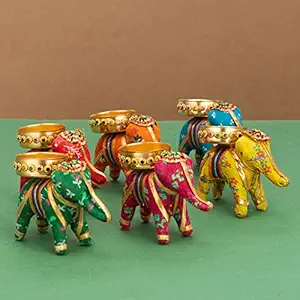आरती का महत्व और इसका गहरा आध्यात्मिक अर्थ
परिचय
आरती हिंदू पूजा का एक महत्वपूर्ण भाग है, जिसमें दीप जलाकर देवता की आराधना की जाती है। यह केवल एक धार्मिक अनुष्ठान नहीं, बल्कि गहरा आध्यात्मिक अर्थ भी रखता है। आरती अज्ञान रूपी अंधकार को दूर कर दिव्य ज्ञान के प्रकाश को आत्मसात करने का प्रतीक है।
आरती क्या है?
आरती एक भक्ति प्रार्थना है जिसमें घी या तेल का दीप जलाकर उसे देवता के समक्ष घुमाया जाता है। इस दौरान भजन, मंत्र और स्तुतियां गाई जाती हैं। अंत में दीपक की लौ से आशीर्वाद ग्रहण किया जाता है।
आरती का आध्यात्मिक महत्व
- दिव्य प्रकाश का प्रतीक – आरती की ज्योति अज्ञानता के अंधकार को मिटाकर ज्ञान का प्रकाश फैलाती है।
- भक्ति और समर्पण का भाव – यह भगवान के प्रति प्रेम, श्रद्धा और आभार व्यक्त करने का तरीका है।
- मन और आत्मा की शुद्धि – आरती का प्रकाश, धूप और मंत्र मिलकर सकारात्मक ऊर्जा का निर्माण करते हैं।
- सांसारिक चक्र का प्रतीक – दीपक को घुमाने की क्रिया जीवन के चक्र को दर्शाती है, जो ईश्वर से उत्पन्न होकर उन्हीं में विलीन होता है।
- दिव्य आशीर्वाद की प्राप्ति – आरती के बाद दीपक की लौ से आशीर्वाद लेना सौभाग्य एवं कल्याण का प्रतीक है।
आरती के प्रकार
- मंगल आरती – सुबह की आरती, दिन के शुभारंभ हेतु।
- संध्या आरती – संध्या समय की आरती, प्रभु का धन्यवाद करने हेतु।
- श्रृंगार आरती – देवता के श्रृंगार के पश्चात की जाने वाली आरती।
- भोग आरती – देवता को भोजन अर्पित करने से पहले की जाती है।
- शयन आरती – रात्रि में मंदिर बंद करने से पहले की जाने वाली आरती।
प्रसिद्ध आरतियाँ
- गंगा आरती (वाराणसी, हरिद्वार, ऋषिकेश)
- शिरडी साईं बाबा आरती
- द्वारकाधीश आरती
- स्वर्ण मंदिर (अमृतसर) की आरती
आरती करने के लाभ
- नकारात्मक ऊर्जा को दूर करता है।
- ध्यान और भक्ति को बढ़ाता है।
- समाज में आध्यात्मिक एकता लाता है।
- भगवान से जुड़ने का सशक्त माध्यम है।
Overview of Aarti
Definition & Meaning
Aarti is a Hindu devotional ritual involving the waving of lighted lamps before deities, expressing reverence and devotion.
Origin & History
Aarti has ancient origins in Vedic traditions, evolving over centuries as a key element of Hindu worship practices.
Purpose & Importance
Aarti symbolizes removing darkness (ignorance) and invoking divine blessings, fostering spiritual upliftment and mindfulness.
Timing & Occasions
Aarti is performed daily, during festivals, or special ceremonies in temples and homes to honor deities and strengthen devotion.
Global Recognition
Aarti practices have gained international appreciation, spreading Hindu devotional culture and meditation practices worldwide.
Spiritual Significance
Symbolism of Light
The lighted lamp in Aarti represents knowledge, divine presence, and spiritual illumination, dispelling ignorance and darkness.
Connection with Deities
Aarti strengthens the devotee’s connection with the divine, enhancing faith, love, and surrender to God.
Inner Purification
Participating in Aarti purifies the mind, emotions, and heart, creating inner peace and spiritual clarity.
Energy & Vibrations
Chanting Aarti hymns and ringing bells generate positive energy, enhancing meditation and spiritual experience.
Collective Devotion
Group Aarti sessions build unity, harmony, and shared devotion among participants, fostering community bonding.
Ritual Elements
Lamps & Offerings
Aarti involves lighted lamps, incense, flowers, and food offerings presented to deities as acts of devotion.
Songs & Chants
Devotional songs or hymns accompany Aarti, invoking spiritual emotions and enhancing the ritual’s sacredness.
Temple vs Home Aarti
Aarti can be performed in temples or homes, each with specific customs but the same focus on devotion and reverence.
Sequence & Procedure
Aarti follows a structured sequence: lighting lamps, circling them before the deity, singing hymns, and offering flowers or prasad.
Role of Bells & Conch
Ringing bells and blowing conch shells during Aarti enhance spiritual vibrations, purify surroundings, and focus the mind.
Benefits & Effects
Mental Peace
Participating in Aarti calms the mind, reduces stress, and promotes emotional balance and inner tranquility.
Spiritual Growth
Aarti nurtures devotion, faith, and spiritual awareness, helping individuals progress on their spiritual path.
Health & Wellbeing
The ritual's chants and aromas contribute to relaxation, mental clarity, and positive physiological effects.
Community Bonding
Group Aarti sessions encourage togetherness, mutual respect, and harmonious relationships within families and communities.
Positive Energy & Atmosphere
Aarti generates a spiritually uplifting environment, filling homes and temples with joy, devotion, and light.
Types of Aarti
Daily Aarti
Performed daily in the morning or evening to express gratitude and devotion, often in households and small temples.
Festival Aarti
Special Aarti conducted during festivals like Diwali, Navratri, and Janmashtami, accompanied by elaborate rituals and decorations.
Temple Aarti
Performed in larger temples with full rituals, music, and community participation, creating a sacred atmosphere.
Home Aarti
Simple Aarti done at home with family members, using minimal lamps and offerings, fostering daily spiritual connection.
Special Devotional Aarti
Performed for specific deities or intentions, such as health, prosperity, or success, with personalized prayers and rituals.
Aarti is a Hindu devotional ritual involving the waving of lighted lamps before deities, expressing reverence and devotion.
Aarti has ancient origins in Vedic traditions, evolving over centuries as a key element of Hindu worship practices.
Aarti symbolizes removing darkness (ignorance) and invoking divine blessings, fostering spiritual upliftment and mindfulness.
Aarti is performed daily, during festivals, or special ceremonies in temples and homes to honor deities and strengthen devotion.
Aarti practices have gained international appreciation, spreading Hindu devotional culture and meditation practices worldwide.
The lighted lamp in Aarti represents knowledge, divine presence, and spiritual illumination, dispelling ignorance and darkness.
Aarti strengthens the devotee’s connection with the divine, enhancing faith, love, and surrender to God.
Participating in Aarti purifies the mind, emotions, and heart, creating inner peace and spiritual clarity.
Chanting Aarti hymns and ringing bells generate positive energy, enhancing meditation and spiritual experience.
Group Aarti sessions build unity, harmony, and shared devotion among participants, fostering community bonding.
Aarti involves lighted lamps, incense, flowers, and food offerings presented to deities as acts of devotion.
Devotional songs or hymns accompany Aarti, invoking spiritual emotions and enhancing the ritual’s sacredness.
Aarti can be performed in temples or homes, each with specific customs but the same focus on devotion and reverence.
Aarti follows a structured sequence: lighting lamps, circling them before the deity, singing hymns, and offering flowers or prasad.
Ringing bells and blowing conch shells during Aarti enhance spiritual vibrations, purify surroundings, and focus the mind.
Participating in Aarti calms the mind, reduces stress, and promotes emotional balance and inner tranquility.
Aarti nurtures devotion, faith, and spiritual awareness, helping individuals progress on their spiritual path.
The ritual's chants and aromas contribute to relaxation, mental clarity, and positive physiological effects.
Group Aarti sessions encourage togetherness, mutual respect, and harmonious relationships within families and communities.
Aarti generates a spiritually uplifting environment, filling homes and temples with joy, devotion, and light.
Performed daily in the morning or evening to express gratitude and devotion, often in households and small temples.
Special Aarti conducted during festivals like Diwali, Navratri, and Janmashtami, accompanied by elaborate rituals and decorations.
Performed in larger temples with full rituals, music, and community participation, creating a sacred atmosphere.
Simple Aarti done at home with family members, using minimal lamps and offerings, fostering daily spiritual connection.
Performed for specific deities or intentions, such as health, prosperity, or success, with personalized prayers and rituals.


